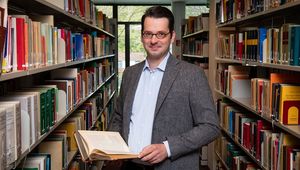Public law plays an important role in our everyday lives. We spoke with Prof. Andreas Wimmer about the applications and implications.

What is your area of research?
Andreas Wimmer: My current area of research focuses on general administrative law, particularly the theory of legal relations, digitalizing administrative procedures, and public liability law.
What exactly is your inaugural lecture about?
Andreas Wimmer: There is a current trend toward digitizing administration and administrative court proceedings and this raises a number of legal issues. While there is great potential to use algorithms, artificial intelligence, and video technology to support procedural efficiency, there are also many inherent hazards and risks that could impact one’s integrity and dignity. My inaugural lecture aims to outline the many possibilities and hazards, as well as pointing out potential solutions.
Why have you chosen to come to the JKU?
Andreas Wimmer: The JKU’s Faculty of Law is a leading faculty that takes due account of social, political and economic upheavals during the 21st century. it is a pleasure for me to be able to work here as part of a highly qualified research team and be able to reach the “highest hanging grapes”, meaning the competitive external funding.
What do you find exciting about your area of law?
Andreas Wimmer: Public law has always served the purpose of preventing a concentration of state power, containing state power, and binding right to exercise legal rules. The 21st century is greatly challenging for the field of public law as states and state institutions are leaning toward extending their power even further, and private actors, particularly global corporations, are also becoming even more powerful, often more powerful than individual states. I am excited about better understanding these developments and exploring legal solutions.
How does your area of expertise impact our everyday lives?
Andreas Wimmer: Our everyday lives include some aspect of public law but most people don’t even realize it. Anyone drinking water in the morning, using water to make coffee, or using water during their morning routine is impacted by water laws which have been created to ensure our supply of clean drinking water. When going to work, the rules of the road apply. When using public transportation, public law regulations come into play, such as the Motor Vehicles Act and the Railway Act. When we read the newspaper on our smartphones, laws regarding data protection and telecommunications apply, just as they do when we chat using Signal or WhatsApp. In the area climate protection, public law plays a key role in, for example, registering electric vehicles or any future bans on oil and gas heating systems. Central legal positions, such as our personal integrity, sense of dignity, privacy, our freedom, and property, are safeguarded by fundamental and human rights. At the end of the day and before going to bed, we use electricity to, for example, switch the bedside lamp off and activate the boiler to heat up water for the next day. Then it starts all over again.
Why should students take your classes?
Andreas Wimmer: My educational concept revolves around being on equal footing with students, treating them like adults, mature citizens, and encouraging them time and again to speak up and defend their personal opinions. In this regard, it's about empowerment. My course evaluations also show time and again that I am able to explain things well. This makes me particularly happy and makes students want to take my classes.
What are you currently working on?
Andreas Wimmer: I am currently involved in three (partially externally funded) research projects: "Verhandeln mit Videotechnologie", "System des öffentlichen Haftungsrechts", and "Der Schutz des Kindeswohls im Asyl- und Migrationsrecht". Another research project, “Das Rechtsverhältnis - Zur theoretischen und praktischen Bedeutung einer vernachlässigten Rechtsfigur“ is currently in the planning stages.
What are your hobbies?
Andreas Wimmer: My family is my hobby. My favorite pastime is spending time with my wife and our two sons (ages two and four), discovering the world together, and learning from and with each other. The most fascinating things in my life by far is what I have been learning from my wife and children.
What else do you want to do or achieve in your life?
Andreas Wimmer: In general, I would like to continue evolving and growing as a person and I want to deepen my understanding of human society. I believe this can only be accomplished by being flexible and mobile as well as by acquiring experience. I would like to be a loving and understanding husband and father as well as a reliable support-system. Professionally - and in accordance with § 98 of the Austrian Universities Act - I would like to attain a university professorship in the field of public law. This feels like the next natural step as part of (my) academic career.
 Go to JKU Homepage
Go to JKU Homepage









